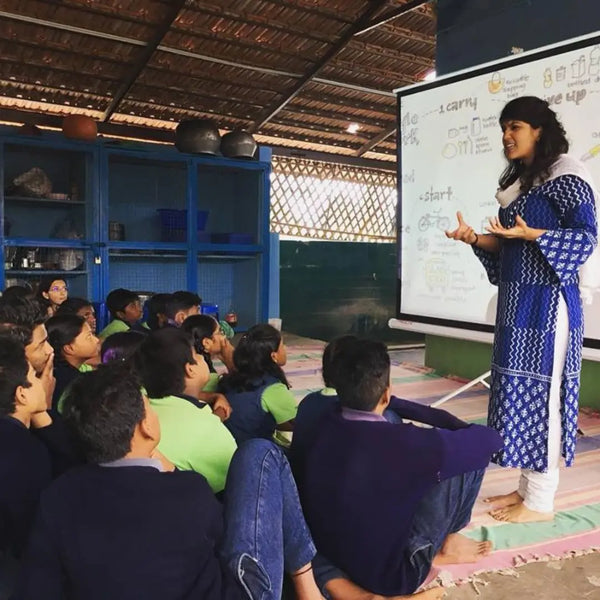Eco-Friendly Traditions for a Better Tomorrow
Creating eco-friendly traditions together, teaches the value of environmental responsibility providing for a vibrant future for the generations that come along
Continue reading Ditch the chemical-loaded deodorants making your pits a science experiment. Our natural deodorants actually work, keeping you fresh, dry, and smelling amazing all day without the toxins.
Continue reading
Ditch the chemical-loaded deodorants making your pits a science experiment. Our natural deodorants actually work, keeping you fresh, dry, and smelling amazing all day without the toxins.
Continue reading
 Eco-friendly and sustainable toothbrushes are the real game, folks! Replace your plastic tootbrush today with our compostable toothbrushes.
Continue reading
Eco-friendly and sustainable toothbrushes are the real game, folks! Replace your plastic tootbrush today with our compostable toothbrushes.
Continue reading
 At Bare Necessities, we take customer feedback very seriously, and always work on improving our packaging and product formulations.
Continue reading
At Bare Necessities, we take customer feedback very seriously, and always work on improving our packaging and product formulations.
Continue reading
 The eco-friendly powder format handwash by Bare Necessities is what you need to keep your hands clean, and also your carbon footprint!
Continue reading
The eco-friendly powder format handwash by Bare Necessities is what you need to keep your hands clean, and also your carbon footprint!
Continue reading
 Something gentle, sustainable and most importantly, truly useful to the women in your team. Gifts made by women, for women, rooted in care and meant to last beyond the day.
Continue reading
Something gentle, sustainable and most importantly, truly useful to the women in your team. Gifts made by women, for women, rooted in care and meant to last beyond the day.
Continue reading
 We had the joy of curating sustainable gifting hampers for the Australian Consulate General in Bengaluru. Check how we customised it to perfection
Continue reading
We had the joy of curating sustainable gifting hampers for the Australian Consulate General in Bengaluru. Check how we customised it to perfection
Continue reading
 Sustainable gifting is becoming an extension of modern real estate values. As developers integrate green design zero-waste hampers from Bare Necessities offer a way to reflect the same ethos in every gesture.
Continue reading
Sustainable gifting is becoming an extension of modern real estate values. As developers integrate green design zero-waste hampers from Bare Necessities offer a way to reflect the same ethos in every gesture.
Continue reading
 Ready for secret santa party? Don't go without these lovely secret santa approved festive christmas gift hampers.
Continue reading
Ready for secret santa party? Don't go without these lovely secret santa approved festive christmas gift hampers.
Continue reading
 We left BLR Hubba with meaningful conversations and a growing community of people ready to rethink their relationship with waste.
Continue reading
We left BLR Hubba with meaningful conversations and a growing community of people ready to rethink their relationship with waste.
Continue reading
 Bare Necessities at The Conscious Collective, an initiative by the Godrej Design Lab in Mumbai, themed “Reclaiming Cool.”
Continue reading
Bare Necessities at The Conscious Collective, an initiative by the Godrej Design Lab in Mumbai, themed “Reclaiming Cool.”
Continue reading
 Discover how Bare Necessities’ coffee collaborations with India’s top cafés are transforming spent grounds into sustainable, zero-waste self-care products.
Continue reading
Discover how Bare Necessities’ coffee collaborations with India’s top cafés are transforming spent grounds into sustainable, zero-waste self-care products.
Continue reading
 Discover our sustainability workshops for kids that makes sustainability fun and hands-on! Raise a community of greener, conscious children
Continue reading
Discover our sustainability workshops for kids that makes sustainability fun and hands-on! Raise a community of greener, conscious children
Continue reading
 Not every viral skincare trend deserves a spot on your shelf. Simple routines, climate-appropriate products, and listening to your skin will always beat internet hype.
Continue reading
Not every viral skincare trend deserves a spot on your shelf. Simple routines, climate-appropriate products, and listening to your skin will always beat internet hype.
Continue reading
 Catch us at the Namma Bengaluru Challenge'26 at Bangalore International Centre on 24th January!
Continue reading
Catch us at the Namma Bengaluru Challenge'26 at Bangalore International Centre on 24th January!
Continue reading
 Struggling to manage your waste? Here is a quick guide to upgrade yourself when it comes to effective sustainable waste management at home.
Continue reading
Struggling to manage your waste? Here is a quick guide to upgrade yourself when it comes to effective sustainable waste management at home.
Continue reading
 Skincare today often feels like an endless cycle of fixing and buying more, but it doesn’t have to be. At Bare Necessities, we’re redefining skincare as simple, nourishing, and sustainable.
Continue reading
Skincare today often feels like an endless cycle of fixing and buying more, but it doesn’t have to be. At Bare Necessities, we’re redefining skincare as simple, nourishing, and sustainable.
Continue reading
Creating eco-friendly traditions together, teaches the value of environmental responsibility providing for a vibrant future for the generations that come along
Continue readingWith Valentine’s Day just around the corner, it presents the perfect time to celebrate all kinds of love - whether it’s with a partner, friends or family! But the reality is that you don’t need a fancy, expensive date to make lasting memories. Here are sustainable, pocket friendly date ideas that are super fun and meaningful!
Continue readingIndia is on the trajectory to embrace sustainability with innovative business leading the way with eco-friendly solutions. From waste management to innovative packaging and ethical fashion, these green businesses are shaping a greener future
Continue reading
Making intentional purchasing decisions, we can reduce waste, conserve resources and support ethical and sustainable brands. Mindful consumption helps minimise environmental impact, and you can do it too!
Continue readingBegin the New Year with a focus on kindness - both to ourselves and the planet. We share 10 simple, impactful ways to spread kindness while making environmentally friendly choices.
Continue reading